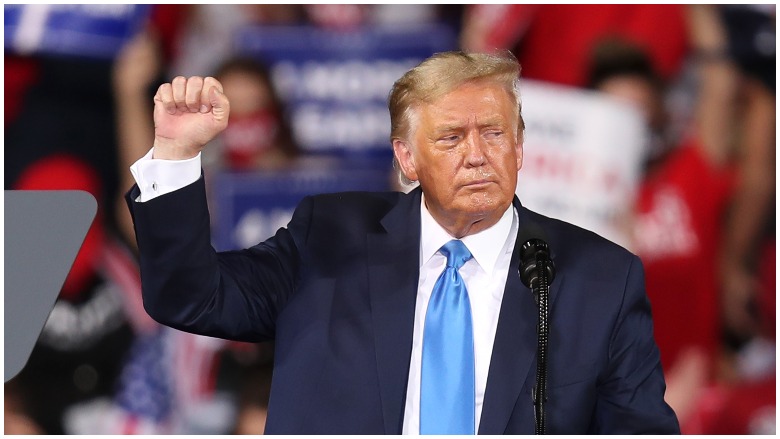During the 2020 presidential debate which some media analysts have referred to as a “s***show,” President Donald Trump said, “I’m urging my supporters to go in to the polls and watch very carefully, because that’s what has to happen. I am urging them to do it.”
The words were concerning to many state officials, according to CNN, who were worried that his words could lead to incidents of harassment between Trump supporters and voters at the polls. With anxiety about in-person voting already high due to the coronavirus pandemic, many state officials are taking precautions to prevent that from occurring.
On October 1, Nevada Attorney General Aaron Ford tweeted that anyone found engaging in voter intimidation could be prosecuted.
What Counts as Voter Intimidation?
The definition and punishment for the “intimidation of voters” is described in 18 U.S.C. § 529 as follows:
Whoever intimidates, threatens, coerces, or attempts to intimidate, threaten, or coerce, any other person for the purpose of interfering with the right of such other person to vote or to vote as he may choose, or of causing such other person to vote for, or not to vote for, any candidate for the office of President, Vice President, Presidential elector, Member of the Senate, Member of the House of Representatives, Delegate from the District of Columbia, or Resident Commissioner, at any election held solely or in part for the purpose of electing such candidate, shall be fined under this title or imprisoned not more than one year, or both.
CNN reported that Pennsylvania, a swing state, has been featured by local Republicans as a location where they are building an “Army for Trump.” NPR reported that Trump supporters had already shown up to an early voting site in Fairfax, Virginia, with a caravan and loud chanting of “Four more years.”
In a recent ad, Trump’s son, Don Jr., said, “We need every able-bodied man, woman to join Army for Trump’s election security operation at defendyourballot.com. We need you to help us watch them. Not just on Election Day, but also during early voting and at the counting boards. President Trump is going to win. Don’t let them steal it.”
Election workers are already a part of the election process and they prepare the polling location, verify voter registration, issue ballots and explain the voting process, as well as checking some ballots for errors, according to the U.S. Election Assistance Commission. The Civil Rights Division of the U.S. Justice Department is responsible for staffing polling places with federal observers who monitor the election.
Democracy Fund senior advisor Tammy Patrock told CNN that there can be a fine line between electioneering and intimidation:
When you have individuals that are outside of a polling place electioneering for their candidate, that is perfectly legal in every state, as long as they’re outside of the legal limit.” However, he said the situation can become tricky when In some instances, that can be misconstrued as intimidation or, depending on what those individuals are saying or doing, it can be intimidation. And so there’s going to be a perception issue here on both sides of the aisle, on what is acceptable and what isn’t.
“The risk of violence is even more prominent in this moment because we have seen escalations of violence across the country over the last six months,” he added.
Here’s How States Have Interpreted Trump’s Comments at the Debate
Thea McDonald, a spokeswoman for Trump’s campaign, told CNN, “Poll watchers are critical to ensuring the fairness of any election, and President Trump’s volunteer poll watchers will be trained to ensure all rules are applied equally, all valid ballots are counted, and all Democrat rule-breaking is called out.”
Since conversations around pandemic-era voting have begun, Trump has raised suspicions about voting-by-mail (also known as absentee ballot voting) and other early voting methods, as the Associated Press reported. Trump himself has told voters to illegally vote twice at his rallies.
Ford and some other state officials have interpreted Trump’s debate “urging” as a call for his supporters to intimidate and deter voters.
“… He wasn’t talking about poll watching. He was talking about voter intimidation,” Ford wrote in his tweet and promised to prosecute anyone found guilty of it. Massachusetts’s attorney general, Maura Healey, also said that she would prosecute voter intimidation and noted that it was “obstruct(ing) the vote” is “a crime.”
Steve Simon, Minnesota’s Secretary of State, told CNN that only one poll watcher per campaign is allowed inside. Philadelphia Mayor Jim Kenney also told The Philadelphia Inquirer that he would be making “interagency plans” after Trump’s debate remark.
Disinformation expert Nina Jankowicz, told The Hill that Trump’s comments were irresponsible. “I just think it’s an extremely irresponsible suggestion or solicitation that the president would do this and encourage people to show up, especially given what we know about the way that Trump supporters have engaged in other violent or intimidating behavior in other places.”
However, the chief legal counsel for the Republican National Committee, Justin Riemer, told NPR that poll watchers recruited by the RNC have no intention of suppressing others’ right to vote. “The Democrats would say that we are there to suppress the vote. That is absolutely not the case. I can assure you that that is not why we have volunteers and attorneys participating in this process,” he said.
READ NEXT: Twitter Gives Debate Moderator Chris Wallace a Grade & It’s Not Great
